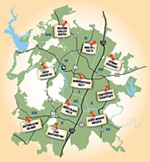City Hall Hustle: Political Drought Withers SMD ... Again
'Gentleman's agreement' stays intact
By Wells Dunbar, Fri., Aug. 22, 2008
A refresher for the forgetful: Despite council members being elected to individual "places," each represents the entire city – and through that diffusion of responsibility, districting proponents charge, they represent no one. Switching to single-member districts – where council members would live, run, and serve in a geographically defined area – would provide neighborhoods with greater accountability, while also delivering more equitable representation to Austin's burgeoning Hispanic population. Conversely, a consistent thorn in the plan's side has been the potential diminution of African-American representation. The so-called "gentleman's agreement" (unofficially but thus far successfully) reserves one council seat – Place 6 – for a black candidate (Place 2, Hispanic), and opponents worry that increasing the council size, as any plan almost certainly would, might diminish black representation, potentially running afoul of the Voting Rights Act. Moreover, under a district system, council members could potentially end up competing to bring home the most bacon – raising the threatening, vaguely ethnic-sounding specter of "ward politics" – although presumably, a mixed system could diminish that threat.
Still, in light of the embarrassingly antiquated gentleman's agreement (created in the Seventies not by the Rainbow Coalition but as a means of marginalizing and compartmentalizing minority representation) and the transmogrification of the neighborhoods into political forces, single-member districts are an idea whose time has come.
Too bad their timing's so bad.
SMDs died at the ballot box six times since 1973, but last year the city convened a Charter Revision Committee to explore whether changing the at-large system is any more feasible nowadays. After the committee came to a loose consensus that change is possible, council squabbled over whether to proceed. In March, swing-vote Will Wynn announced that he couldn't support the idea. Then an unrelated scheduling snafu pushed the charter election off until November, raising hopes SMD might rise again. Would the new council, including campaign-trail advocates Laura Morrison and Randi Shade, bring it back to life?
In the interim, Rudy Williams, until recently president of the Organization of Central East Austin Neighborhoods, has been leading the charge. He recently brought a resolution to the Austin Neighborhoods Council – a group Morrison formerly led – calling on council to adopt an 8-4-1 plan. A hybrid, combining eight single-member seats, four at-large seats (two members elected from two "superdistricts" dividing the city), plus the mayor. Members of OCEAN and the ANC hoped council would place the model before the voters. But they won't this November – and possibly not even in 2010, either.
Recently, Morrison told Williams districting is a nonstarter. "She says there's not the political will on the council to put it up – that means we're gonna have to wait another two years at the minimum to get council to put it on the agenda or to get citizens to demand it." He's flummoxed it won't appear this year, during a presidential election in which "a lot of minorities ... a broad section of the voting population" will cast their ballots.
Williams spreads the blame around thickly. He calls Place 6 Council Member Sheryl Cole's worry that districts would diminish black representation "a myth" and "the politics of fear"; he's also "really disappointed in Mike [Martinez] and our new council members who promised they were really gonna focus support on this issue. When it came time for the rubber to meet the road, they all waffled."
While still supporting an eventual change, Martinez says a November vote "would cause more controversy than it would cause good, because we have very little time to hold public hearings and really discuss this thing out." And while he says he's not opposed to the 8-4-1 plan, "the proposal that came forward is not something that came from the Charter Revision Committee." He says neither he nor Morrison could support the 8-4-1 plan, when "it hasn't gone through a full public vetting process; it's been talked about by a few folks, but it hasn't been talked about communitywide. ... This has to be a grassroots movement from the community. I as a council member can't lead the charge and make it happen. I can create the process, and I tried to create the process by putting the Charter Revision Committee together, but the grassroots movement wasn't there."
In one last cruel twist, the provision which pushed the charter election from May to November – engendering the hope districts might make it on the ballot after all – now pushes it even further into the future. Under state law, changes to a city charter can only occur once every two years – and because the November 2010 election falls a few days before 2008's Nov. 4 election, the opportunity is likely not to recur until May 2011.
How tall will the grassroots have grown by then?
Got something to say on the subject? Send a letter to the editor.










